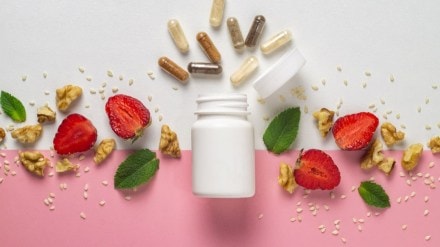With the longevity industry emerging as a multi-billion-dollar industry, efforts to extend human lifespan are on the rise. With rapid advances in longevity technology and personalised health, more and more people are jumping onto the anti-aging bandwagon.
However, many of the longest-lived people stick to simple daily routines, and one of the most consistent habits among them is eating a well-balanced diet.
People in Blue Zones are focussed on eating plant-based diet like vegetables, fruits, whole grains, and beans. Their diet revolves around whole, unprocessed foods like nuts, seeds, and olive oil, with little processed good or sugar.
So, what is it that one can do to live longer than the average people. Dr. Hillary Lin, Stanford-trained physician, longevity expert and CEO of CareCore shared with Parade Magazine a list of vitamins that are essential for healthy ageing, and also those that one must skip.
However, one must remember that supplements cannot replace a healthy diet, and must be taken strictly on advice of your doctor. What one should be particularly aware of is the deficiency of any vitamin, which could be confirmed after a blood test. Vitamin B12 or Vitamin D can wreak havoc on several aspects of health.
Healthy eating can significantly lower risk of premature death in addition to their environmental impact, said a study published in The American Journal of Clinical Nutrition.
Best vitamins for healthy ageing
Vitamins D3 and K2
If there is one vitamin combo that can steer you towards healthy ageing, it is Vitamin D3 and K2. Having them together can slash risk of heart disease and strengthen bone health. Dr Lin says this combo makes sense as D3 helps the body absorb calcium, while K2 aids its delivery to the bones, rather than arteries.
“I recommend 2,000 to 4,000 IU of D3 with 100 to 200 mcg of K2 (MK-7 form) daily, but test your levels first. The sweet spot for vitamin D is 40-60 ng/mL,” says Dr Lin.
Studies have shown that high vitamin K2 intake is associated with reduced coronary artery calcification and CVD risk, according to PubMed Central.
Omega-3s (EPA/DHA)
One of the basic components to promote healthy ageing is anti-inflammatory foods, and Omega-3s can be the best bet for your brain and heart health. That’s what Dr. Lin suggests you as the one of the top supplements that can slow ageing.
“I tell patients to aim for at least two grams, combined EPA/DHA daily from high-quality fish or algae-based supplements, although testing can help refine this dose,” Dr. Lin told Parade.
When we say Omega-3s, it means foods like chia seeds, walnuts, plant-based oils, salmon, mackerel, tuna, fortified yogurt, milks and eggs. Fish oil supplements also are high on Omega.
Creatine
Creatine supplementation could help support healthy ageing as according to studies it has potential to increase aging muscle mass and muscle strength, reduce the risk of falls and lower the loss of bone mineral. According to Journal of Clinical Medicine, preliminary evidence indicates that creatine may have anti-inflammatory properties.
It’s natural to lose lean muscle mass when you age, and building or preserving the supply becomes crucial.
“Creatine isn’t just for bodybuilders—the data on cognitive function and muscle preservation in aging adults is compelling,” Dr. Lin says. “Five grams daily can help maintain muscle mass, bone density and even brain health as we age.”
Magnesium
The most underrated supplement, and certainly longevity supplement, magnesium could be your secret weapon for maintaining youthful look.
Dr Lin says the mineral is involved in over 300 enzymatic reactions, including DNA repair and most people are sub-clinically deficient.
“There are a dozen variations of magnesium, but for simplicity, you can rely on magnesium citrate for general use or magnesium glycinate for sleep support,” says the expert.
Which vitamins to skip
Multivitamins
The longevity expert says generic multivitamins could be risky as they are not customised for an individual.
“Longevity medicine is about personalization, not throwing a handful of random nutrients at the wall and hoping something sticks,” Dr. Lin says. “You might be deficient in magnesium but overdoing iron, and a multivitamin won’t account for that.”
High-dose Vitamin E
This is another supplement to skip as Dr Lin says high-dose vitamin E could increase prostate cancer risk, as per SELECT trial. She says that flooding the body with antioxidants can backfire.
